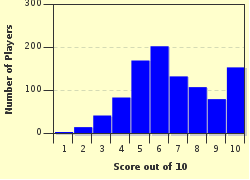Quiz Answer Key and Fun Facts
1. NOTE: This quiz is about German composite words that, if translated into English piece by piece, would give quite strange-sounding combinations. To solve it, analyze the English word in question, translate it into German piece by piece and then find the correct English meaning for it.
Example: If you were given some HOUSETASKS by a teacher, that would not be chores, but rather homework, since house = German "Haus" and tasks = German "Aufgaben" and "Hausaufgaben" means homework.
Freshly arrived, Hubert enters a major department store to buy a certain device present in many US households. Not knowing its real name, he translates a common German term for the device into English too literally and asks the clerk: "I would like to buy a FARSEER, please." What does he want to purchase?
2. Having secured his purchase and arranged for delivery, Hubert wants to go to his new home. But, alas, he is lacking transportation - and a word again. So once more, he summons his limited vocabulary and composes a new word, asking a helpful information booth attendant: "Do you know where I could get a DRIVECARD, please?". What does he need?
3. Another adventure is successfully solved and Hubert can inspect his new home. It is well furnished, but his COOLWARDROBE is sadly empty. So he will have to make another run for the store, but what is the word he made up this time?
4. Hubert is finally getting smarter and making sure he only uses words he already has heard elsewhere, like in songs. This does not, however, prevent him from making a major faux pas in, with some urgency, asking for the location of the nearest WATERLOO. What is he in need of?
5. After overcoming his trauma of confusing Belgian battle locations with actual English words, Hubert returns to dealing with the nasties of the daily life, amongst them, of course, everything to do with money. His bank teller, however, has some problems understanding what those 80 dollars marked STREAMBILL are for. Can you help him?
6. Time to go to work! As an office clerk, Hubert naturally needs to know the locations of all the important devices. However, no one can show him a WRITEMACHINE. Can you figure out what he wants?
7. There is no place like the welcome party at a new job to thoroughly and irrevocably embarrass oneself in the eyes of all co-workers. Hubert of course did not skip this chance when he, even completely misjudging the German composition of the word, asked when the GREENDUNG of the company had taken place. What date did he actually try to ask for?
8. "FORESIGHT!" Hubert yelled at his colleague just crossing his path. For once, he had actually managed to arrive at a real English word, but it was still not quite what he wanted to express. What word or words should he have used instead?
9. In spite of his language skills or rather lack thereof, Hubert was quickly considered for a promotion. This would however have meant moving to Quebec and thus he asked his boss when he would have to HIT HIS DESHEATHING. His boss needed three days to figure out what Hubert meant; I am sure you'll get this faster. He needed time to do what?
10. Finally, Hubert has made it in the United States. He has even been appointed vice president of his local golf club. But, alas, he manages to collect one last icy stare from a longterm member when he kindly reminded the older gentleman that his WITHLIMBSATCARRY is overdue. What did he ask for?
Source: Author
WesleyCrusher
This quiz was reviewed by FunTrivia editor
stedman before going online.
Any errors found in FunTrivia content are routinely corrected through our feedback system.

